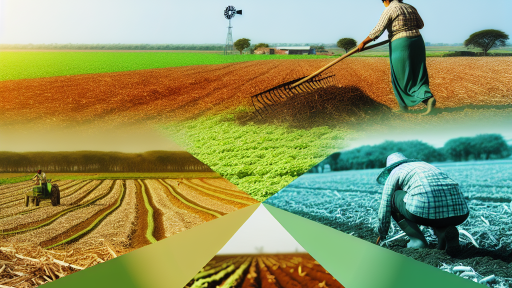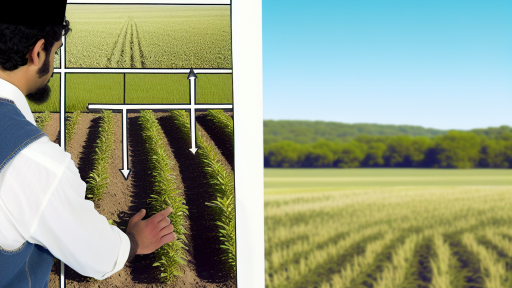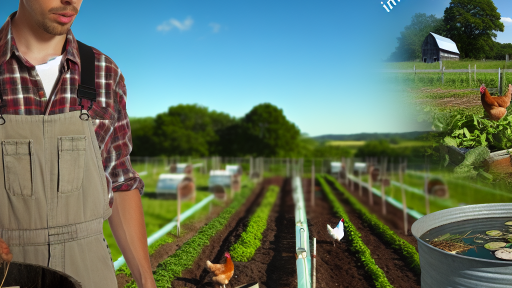Introduction to Waste Management in Agriculture
Waste management is a crucial aspect of modern agriculture.
Farmers generate various types of waste, including crop residues and livestock manure.
Effective waste management minimizes the negative environmental impact.
Moreover, it promotes sustainability and resource efficiency on farms.
The Importance of Waste Management
Implementing waste management improves soil health.
Healthy soil enhances crop productivity and reduces chemical inputs.
Additionally, managing waste can lead to alternative revenue streams for farmers.
For instance, composting organic waste can produce valuable fertilizers.
Current Waste Management Practices
Many farmers use conventional methods, such as burning crop residues.
However, these practices can harm air quality and contribute to climate change.
Innovative approaches are essential to address these challenges effectively.
Challenges in Waste Management
Farmers often face obstacles in implementing effective waste management systems.
Limited financial resources can hinder the adoption of new technologies.
Additionally, lack of education about sustainable practices can be a barrier.
Opportunity for Innovation
The agricultural sector has significant potential for innovative waste management solutions.
Transform Your Agribusiness
Unlock your farm's potential with expert advice tailored to your needs. Get actionable steps that drive real results.
Get StartedBy embracing new technologies, farmers can transform waste into valuable resources.
Collaboration among farmers, researchers, and policymakers can drive this change.
The Importance of Innovative Waste Management for Sustainable Farming
Preserving Natural Resources
Effective waste management helps conserve vital natural resources.
It reduces the need for raw materials by recycling agricultural byproducts.
This practice aligns with sustainable farming principles.
Enhancing Soil Health
Innovative waste management improves soil health significantly.
Composting organic waste enriches the soil with nutrients.
This strategy promotes biodiversity and soil microorganism activity.
Reducing Environmental Impact
Proper waste management minimizes pollution from agricultural operations.
It captures emissions of greenhouse gases effectively.
Consequently, farmers can contribute to climate change mitigation.
Economic Benefits
Reducing waste enhances profitability for farmers.
Innovative practices can create new revenue streams through recycling.
Moreover, the reduced cost in waste disposal positively impacts the bottom line.
Compliance with Regulations
Waste management ensures compliance with environmental regulations.
It helps farmers avoid fines and sanctions associated with poor waste practices.
Staying ahead of regulations showcases a commitment to sustainability.
Community Engagement
Farmers who adopt innovative waste management can engage their communities.
Educational workshops on effective practices foster local collaboration.
This engagement enhances the reputation of farming within the community.
Composting Organic Waste: Techniques and Benefits
Understanding Composting
Composting transforms organic waste into valuable soil amendment.
This process reduces waste and enriches soil health.
Farmers can create compost from various materials, including plant residues and kitchen scraps.
Essential Techniques for Effective Composting
Start by choosing a suitable location for your compost pile.
Showcase Your Farming Business
Publish your professional farming services profile on our blog for a one-time fee of $200 and reach a dedicated audience of farmers and agribusiness owners.
Publish Your ProfileMake sure this area has good drainage and sunshine.
Next, layer your materials strategically.
Combine green materials, such as grass clippings, with brown materials, like dry leaves.
This balance is crucial for efficient decomposition.
Monitoring Temperature
Regularly check the temperature of your compost pile.
Avoid composting if it’s too cold or too hot.
Maintaining an optimal temperature enhances microbial activity.
Turning Your Pile
Turn your compost regularly to aerate it.
This process ensures even decomposition and prevents odors.
Use a pitchfork or shovel to mix the materials well.
Benefits of Composting
Composting offers numerous benefits to farmers.
It enhances soil fertility by adding essential nutrients.
Moreover, it improves soil structure, leading to better water retention.
Waste Reduction
This practice significantly reduces the amount of organic waste sent to landfills.
By composting, farmers contribute to waste management efforts.
Pest Management
Composting can help control pests naturally.
Healthy soil promotes robust plants that resist pests.
As a result, farmers can reduce reliance on chemical pesticides.
Summary of Key Points
- Composting is a simple yet effective waste management technique.
- It enriches soil health and supports sustainable farming practices.
- Farmers can implement composting to minimize waste and improve productivity.
Gain More Insights: Sustainable Crop Rotation Plans for Modern Farmers
Utilizing Biomass for Energy Production on Farms
Introduction to Biomass Energy
Biomass energy is derived from organic materials.
Farmers can use agricultural waste as a valuable energy source.
This process offers an effective waste management solution.
Moreover, it reduces dependence on fossil fuels.
Types of Biomass Sources
Farmers can utilize various biomass sources for energy production.
- Crops residues, such as corn stalks and wheat straw.
- Animal manure from livestock operations.
- Wood chips and sawdust from local mills.
- Grass clippings and other landscaping waste.
These materials can be converted into energy through different methods.
Energy Conversion Techniques
Farmers have several options for converting biomass into energy.
- Combustion: Burning biomass to generate heat.
- Gasification: Converting biomass into gas for power generation.
- Anaerobic digestion: Breaking down organic matter to produce biogas.
- Biodiesel production: Processing oils and fats into renewable fuel.
Each technique offers unique advantages for farm energy needs.
Benefits of Biomass Energy on Farms
Utilizing biomass can lead to significant cost savings.
Farmers can reduce their energy bills by producing energy on-site.
Additionally, it contributes to environmental sustainability.
Moreover, it creates new revenue streams from waste materials.
Farmers can also enhance soil health and reduce waste disposal costs.
Case Studies of Successful Implementation
Many farmers have successfully implemented biomass energy systems.
For instance, the Green Valley Farm produces biogas from manure.
This biogas powers farm equipment and generates electricity.
Another example is Elmwood Farms, using corn stalks for bioenergy.
These successful models demonstrate the viability of biomass energy.
Steps for Farmers to Transition to Biomass Energy
Farmers can take specific steps to transition to biomass energy.
- Assess available biomass resources on the farm.
- Evaluate the energy needs and potential savings.
- Research suitable energy conversion technologies.
- Consult with experts for system design and implementation.
- Monitor and optimize the energy production process.
Following these steps can facilitate a successful transition.
Overcoming Challenges in Biomass Energy Adoption
Adopting biomass energy presents several challenges.
Showcase Your Farming Business
Publish your professional farming services profile on our blog for a one-time fee of $200 and reach a dedicated audience of farmers and agribusiness owners.
Publish Your ProfileFarmers may face initial capital costs for equipment.
Additionally, logistical issues in collecting and processing biomass can arise.
Nevertheless, government incentives can alleviate financial burdens.
Moreover, community partnerships can assist in overcoming barriers.
Learn More: Designing Farm Layouts for Optimal Water Use
Recycling Agricultural Plastics: Strategies and Challenges
Importance of Recycling
Recycling agricultural plastics significantly reduces waste on farms.
It conserves valuable resources like petroleum products used in plastic production.
Moreover, recycling helps to decrease greenhouse gas emissions.
Common Types of Agricultural Plastics
Farmers use several types of plastics regularly.
- Plastic mulch
- Greenhouse covers
- Seedling trays
- Fertilizer bags
- Pesticide containers
Strategies for Successful Recycling
Implementing effective recycling programs begins with education.
Farmers should educate themselves on local recycling options.
Additionally, establishing partnerships with recycling companies can help.
For instance, local organizations like GreenHire can facilitate recycling programs.
Creating a Collection System
A well-organized collection system is key to effective recycling.
Farmers can set up designated areas for plastic waste.
They should label these areas clearly for ease of use.
Engaging Employees and Community
Engaging farm employees ensures everyone understands recycling importance.
Team meetings can highlight best recycling practices.
Furthermore, community events may encourage local participation.
Challenges Faced in Recycling
Several challenges hinder effective recycling of agricultural plastics.
Contamination of plastics is a significant issue.
For example, leftover chemicals can make plastics non-recyclable.
Cost of Recycling Programs
Establishing recycling programs can incur initial costs.
Farmers might face high transportation fees to recycling centers.
Despite this, long-term savings can outweigh these initial investments.
Limited Recycling Facilities
The availability of recycling facilities varies by region.
Some areas may lack access to proper recycling infrastructure.
This limitation complicates logistic arrangements for farmers.
Future of Agricultural Plastics Recycling
Investing in new technologies could improve recycling efficiency.
Research into biodegradable plastics offers hope for the future.
Increased collaboration among farmers could strengthen recycling efforts.
Ultimately, embracing innovative solutions will benefit the entire agricultural sector.
Gain More Insights: How Farmers Can Implement Carbon Sequestration
Implementing Anaerobic Digestion for Livestock Waste
Understanding Anaerobic Digestion
Anaerobic digestion converts organic material into biogas in the absence of oxygen.
This process occurs in specialized containers called digesters.
Farmers can utilize livestock waste effectively through this technology.
Moreover, it reduces methane emissions while generating renewable energy.
Benefits of Anaerobic Digestion for Farmers
This method transforms waste into valuable resources.
First, it produces biogas, which can substitute fossil fuels.
Second, the remaining digestate enriches the soil as a natural fertilizer.
Showcase Your Farming Business
Publish your professional farming services profile on our blog for a one-time fee of $200 and reach a dedicated audience of farmers and agribusiness owners.
Publish Your ProfileAdditionally, it helps lower waste disposal costs for farmers.
It also supports compliance with environmental regulations.
Implementing Anaerobic Digesters
Farmers should begin with careful planning and site selection.
Assessing waste volumes and types is crucial for success.
Next, choosing the right digester design is essential.
Moreover, consider local climate conditions during selection.
Operational Considerations
Regular maintenance and monitoring are essential for optimal performance.
Farmers must train staff to operate the systems efficiently.
Additionally, keeping detailed records helps in managing the process.
It’s advisable to collaborate with experts for best practices.
Case Studies and Success Stories
Many farmers have already successfully implemented anaerobic digestion.
For example, Smith Farms turned waste into energy and fertilizer.
They reported significant cost savings and environmental benefits.
Additionally, Green Pastures Dairy expanded its digester operations last year.
Future Prospects
The demand for renewable energy continues to grow worldwide.
Anaerobic digestion presents an innovative solution for farmers.
As technologies advance, efficiencies will likely improve.
Farmers should remain informed on developments in this field.
Uncover the Details: Crop Rotation To Boost Soil Health Naturally

Integrating Circular Economy Principles in Farm Waste Management
Understanding the Circular Economy
The circular economy promotes value creation through resource reuse.
It contrasts with the traditional linear model of “take, make, dispose.”
This approach reduces waste and conserves essential resources.
Moreover, it offers economic benefits to farmers.
Composting Organic Waste
Composting is an effective way to manage organic waste.
Farmers can convert scraps into nutrient-rich soil amendments.
This practice enhances soil health and reduces chemical fertilizer use.
Additionally, it minimizes landfill contributions.
Utilizing Crop Residues
Farmers can repurpose crop residues instead of burning them.
These residues can serve as animal feed or mulch.
Using residuals improves soil structure and fertility.
It also supports crop rotation and diversity.
Implementing Waste-to-Energy Solutions
Waste-to-energy technologies offer innovative waste management options.
Farmers can convert waste materials into renewable energy sources.
Biogas generation from manure is a prominent example.
Such systems reduce greenhouse gas emissions effectively.
Collaboration with Local Industries
Establishing partnerships with local industries can enhance waste management.
Farmers can convert industrial by-products into useful inputs.
This synergy reduces overall waste and fosters a local circular economy.
For instance, food processing waste can be used as animal feed.
Integrating Technology for Efficiency
Adopting technology can significantly improve waste management practices.
Showcase Your Farming Business
Publish your professional farming services profile on our blog for a one-time fee of $200 and reach a dedicated audience of farmers and agribusiness owners.
Publish Your ProfileFarmers can track waste generation through digital tools.
Data analytics can identify areas for improvement.
Ultimately, technology leads to more efficient resource use.
Educating and Engaging Communities
Education plays a vital role in implementing circular practices.
Farmers should advocate for responsible waste management techniques.
Community engagement can foster collective action.
Workshops and training can empower farmers and local residents.
Technology Solutions for Monitoring and Reducing Waste
Implementing Smart Sensors
Farmers can deploy smart sensors to monitor waste levels effectively.
These sensors provide real-time data on waste accumulation.
As a result, farmers can implement timely interventions.
Smart sensors can also track composting processes with precision.
Utilizing Drones for Waste Assessment
Drones offer an innovative solution for monitoring farmland.
They can identify areas with excessive waste quickly.
Farmers can analyze aerial images to assess waste management efforts.
This technology allows for better planning and resource allocation.
Adopting Data Analytics
Data analytics can optimize waste management strategies on farms.
Farmers can analyze historical waste data to identify patterns.
This analysis leads to informed decision-making and efficiency.
Moreover, predictive analytics can forecast waste generation.
Integrating Automation Systems
Automation systems can streamline waste collection and processing.
Automated machines can sort and separate materials effectively.
Such systems reduce human error and improve operational efficiency.
As a result, farmers can minimize waste overall.
Utilizing Mobile Applications for Monitoring
Mobile applications enhance waste tracking on the go.
Farmers can record waste data instantly through their smartphones.
This instantaneous feedback helps improve waste management tactics.
Furthermore, these apps can send alerts when waste levels are critical.
Implementing Circular Economy Practices
Circular economy practices focus on reusing waste materials.
Farmers can convert organic waste into compost or bioenergy.
This approach reduces the volume of waste sent to landfills.
Additionally, it promotes sustainability and resource conservation.
Engaging with IoT Solutions
Internet of Things (IoT) solutions provide integrated waste management systems.
These systems connect various waste management technologies smoothly.
Farmers can manage waste more effectively through interconnected devices.
This technology supports continuous monitoring for optimal results.
Collaborative Waste Management: Partnering with Local Communities
Building Strong Local Partnerships
Farmers can greatly benefit from collaborating with local communities.
These partnerships can lead to innovative waste management solutions.
Farmers should engage with local residents to identify waste challenges.
Communication fosters a collective approach to waste management.
Shared Resources for Waste Reduction
Pooling resources enhances waste management efforts significantly.
Showcase Your Farming Business
Publish your professional farming services profile on our blog for a one-time fee of $200 and reach a dedicated audience of farmers and agribusiness owners.
Publish Your ProfileFarmers can share equipment and facilities for waste processing.
This cooperation reduces costs and improves efficiency.
Local communities can provide manpower for waste collection initiatives.
Educational Initiatives
Education plays a crucial role in effective waste management.
Farmers can organize workshops to share knowledge with community members.
These events can focus on composting, recycling, and reducing food waste.
Awareness helps cultivate a culture of sustainability.
Support for Local Recycling Programs
Farmers can support local recycling initiatives actively.
They can contribute their organic waste to community composting efforts.
This collaboration minimizes landfill waste significantly.
Local recycling programs thrive when farmers participate.
Community-Driven Waste Solutions
Encouraging community involvement leads to sustainable solutions.
Farmers can host clean-up days to generate interest and promote teamwork.
Involving local schools promotes environmental stewardship at a young age.
These efforts contribute to cleaner, healthier communities.
Innovative Waste to Resource Models
Transforming waste into resources offers numerous benefits.
Farmers can explore new technologies for waste conversion.
Examples include anaerobic digestion and bioenergy production.
Sharing these innovations with local communities enhances collaboration.
Case Studies: Successful Innovative Waste Management Practices from Farms
Utilizing Anaerobic Digestion
Many farms have successfully implemented anaerobic digestion systems.
This process breaks down organic waste into biogas and digestate.
The biogas can be used for energy production.
Farmers often use digestate as a natural fertilizer.
One notable example is Green Valley Farms in Wisconsin.
They converted waste from dairy cows into renewable energy.
Composting Crop Residues
Composting is another effective waste management technique.
This method reduces the volume of organic waste significantly.
Farmers can transform crop residues into nutrient-rich compost.
The compost improves soil health and fertility.
Smith Family Farm in Oregon exemplifies this practice.
They compost leftovers from their vegetable crops each season.
Implementing Integrated Pest Management (IPM)
Integrated Pest Management helps reduce pesticide waste.
IPM employs various tactics to control pests sustainably.
This includes biological control, habitat manipulation, and crop rotation.
Mountain View Orchards adopted IPM strategies to fight fruit pests.
They reduced chemical pesticide usage by 40% in just two years.
Recycling Plastic Wrapping and Containers
Plastic waste is a significant concern in modern farming.
Several farms now recycle plastic wrapping used for bales.
Coastal Farms initiated a recycling program for plastic containers.
This initiative reduced landfill contributions while saving costs.
Showcase Your Farming Business
Publish your professional farming services profile on our blog for a one-time fee of $200 and reach a dedicated audience of farmers and agribusiness owners.
Publish Your ProfileFarmers receive financial incentives from their local recycling center.
Innovating with Cover Crops
Cover crops can prevent soil erosion and enhance nutrient retention.
Farmers plant these crops during off-seasons to improve soil quality.
Green Fields Farm adopted a cover crop strategy to manage nitrogen levels.
This practice keeps soil rich and minimizes chemical fertilizer needs.
Incorporating Technology for Monitoring Waste
Technology integration is transforming waste management practices.
Farmers can use sensors to monitor waste levels in real-time.
This allows for timely actions to reduce waste pile-up.
AgriTech Analytics developed a mobile app for local farmers.
The app provides waste monitoring and management tips efficiently.
Additional Resources
What is Sustainable Agriculture? | Union of Concerned Scientists




